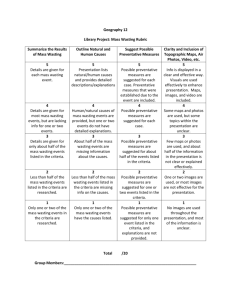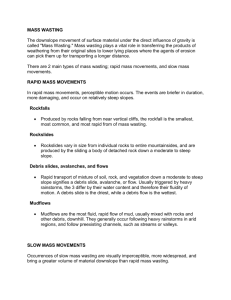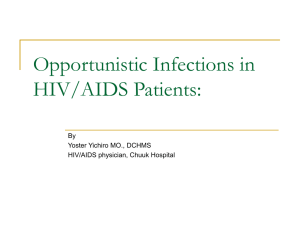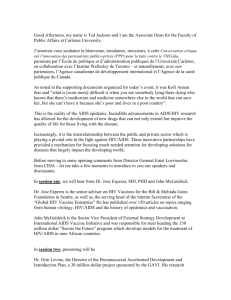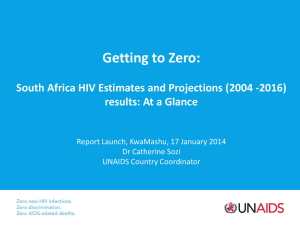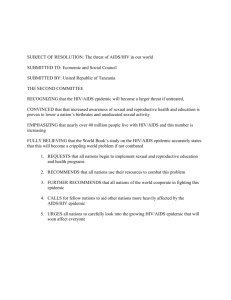519 - The AIDS InfoNet
advertisement
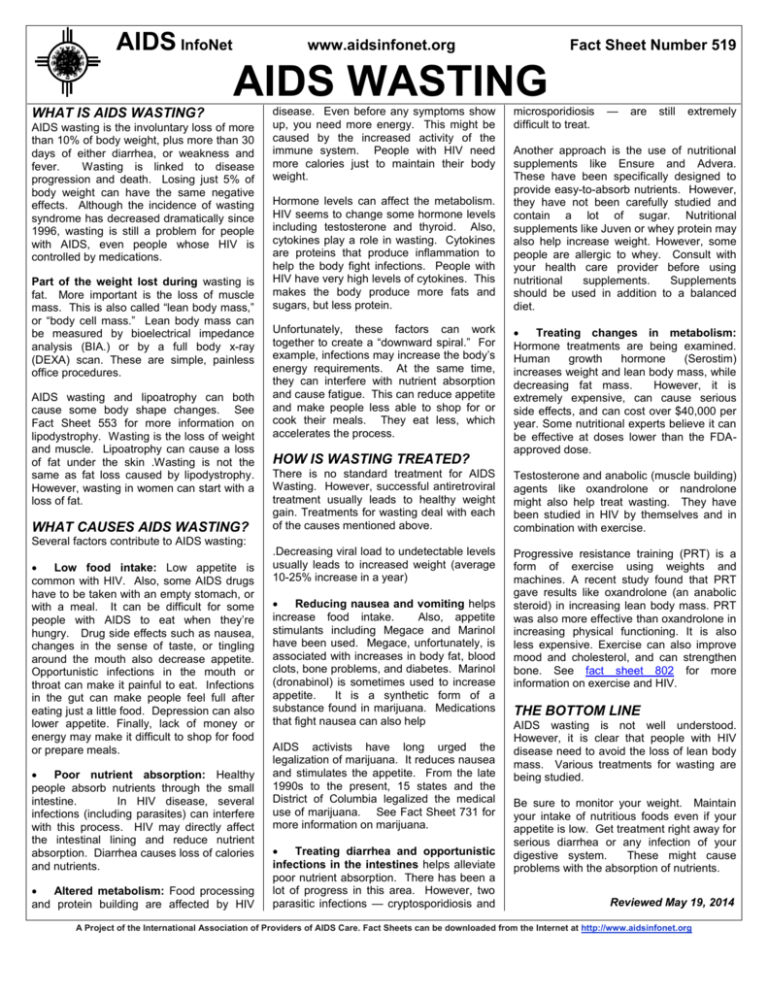
AIDS InfoNet www.aidsinfonet.org Fact Sheet Number 519 AIDS WASTING WHAT IS AIDS WASTING? AIDS wasting is the involuntary loss of more than 10% of body weight, plus more than 30 days of either diarrhea, or weakness and fever. Wasting is linked to disease progression and death. Losing just 5% of body weight can have the same negative effects. Although the incidence of wasting syndrome has decreased dramatically since 1996, wasting is still a problem for people with AIDS, even people whose HIV is controlled by medications. Part of the weight lost during wasting is fat. More important is the loss of muscle mass. This is also called “lean body mass,” or “body cell mass.” Lean body mass can be measured by bioelectrical impedance analysis (BIA.) or by a full body x-ray (DEXA) scan. These are simple, painless office procedures. AIDS wasting and lipoatrophy can both cause some body shape changes. See Fact Sheet 553 for more information on lipodystrophy. Wasting is the loss of weight and muscle. Lipoatrophy can cause a loss of fat under the skin .Wasting is not the same as fat loss caused by lipodystrophy. However, wasting in women can start with a loss of fat. WHAT CAUSES AIDS WASTING? Several factors contribute to AIDS wasting: Low food intake: Low appetite is common with HIV. Also, some AIDS drugs have to be taken with an empty stomach, or with a meal. It can be difficult for some people with AIDS to eat when they’re hungry. Drug side effects such as nausea, changes in the sense of taste, or tingling around the mouth also decrease appetite. Opportunistic infections in the mouth or throat can make it painful to eat. Infections in the gut can make people feel full after eating just a little food. Depression can also lower appetite. Finally, lack of money or energy may make it difficult to shop for food or prepare meals. Poor nutrient absorption: Healthy people absorb nutrients through the small intestine. In HIV disease, several infections (including parasites) can interfere with this process. HIV may directly affect the intestinal lining and reduce nutrient absorption. Diarrhea causes loss of calories and nutrients. Altered metabolism: Food processing and protein building are affected by HIV disease. Even before any symptoms show up, you need more energy. This might be caused by the increased activity of the immune system. People with HIV need more calories just to maintain their body weight. Hormone levels can affect the metabolism. HIV seems to change some hormone levels including testosterone and thyroid. Also, cytokines play a role in wasting. Cytokines are proteins that produce inflammation to help the body fight infections. People with HIV have very high levels of cytokines. This makes the body produce more fats and sugars, but less protein. Unfortunately, these factors can work together to create a “downward spiral.” For example, infections may increase the body’s energy requirements. At the same time, they can interfere with nutrient absorption and cause fatigue. This can reduce appetite and make people less able to shop for or cook their meals. They eat less, which accelerates the process. HOW IS WASTING TREATED? microsporidiosis difficult to treat. — are still extremely Another approach is the use of nutritional supplements like Ensure and Advera. These have been specifically designed to provide easy-to-absorb nutrients. However, they have not been carefully studied and contain a lot of sugar. Nutritional supplements like Juven or whey protein may also help increase weight. However, some people are allergic to whey. Consult with your health care provider before using nutritional supplements. Supplements should be used in addition to a balanced diet. Treating changes in metabolism: Hormone treatments are being examined. Human growth hormone (Serostim) increases weight and lean body mass, while decreasing fat mass. However, it is extremely expensive, can cause serious side effects, and can cost over $40,000 per year. Some nutritional experts believe it can be effective at doses lower than the FDAapproved dose. There is no standard treatment for AIDS Wasting. However, successful antiretroviral treatment usually leads to healthy weight gain. Treatments for wasting deal with each of the causes mentioned above. Testosterone and anabolic (muscle building) agents like oxandrolone or nandrolone might also help treat wasting. They have been studied in HIV by themselves and in combination with exercise. .Decreasing viral load to undetectable levels usually leads to increased weight (average 10-25% increase in a year) Progressive resistance training (PRT) is a form of exercise using weights and machines. A recent study found that PRT gave results like oxandrolone (an anabolic steroid) in increasing lean body mass. PRT was also more effective than oxandrolone in increasing physical functioning. It is also less expensive. Exercise can also improve mood and cholesterol, and can strengthen bone. See fact sheet 802 for more information on exercise and HIV. Reducing nausea and vomiting helps increase food intake. Also, appetite stimulants including Megace and Marinol have been used. Megace, unfortunately, is associated with increases in body fat, blood clots, bone problems, and diabetes. Marinol (dronabinol) is sometimes used to increase appetite. It is a synthetic form of a substance found in marijuana. Medications that fight nausea can also help AIDS activists have long urged the legalization of marijuana. It reduces nausea and stimulates the appetite. From the late 1990s to the present, 15 states and the District of Columbia legalized the medical use of marijuana. See Fact Sheet 731 for more information on marijuana. Treating diarrhea and opportunistic infections in the intestines helps alleviate poor nutrient absorption. There has been a lot of progress in this area. However, two parasitic infections — cryptosporidiosis and THE BOTTOM LINE AIDS wasting is not well understood. However, it is clear that people with HIV disease need to avoid the loss of lean body mass. Various treatments for wasting are being studied. Be sure to monitor your weight. Maintain your intake of nutritious foods even if your appetite is low. Get treatment right away for serious diarrhea or any infection of your digestive system. These might cause problems with the absorption of nutrients. Reviewed May 19, 2014 A Project of the International Association of Providers of AIDS Care. Fact Sheets can be downloaded from the Internet at http://www.aidsinfonet.org


